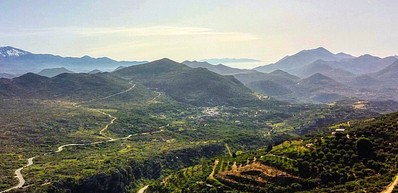
-
![The village of Marathos in Crete]() Provided by: Evangelos Mpikakis/unsplash
Provided by: Evangelos Mpikakis/unsplash

Our travel guides are free to read and explore online. If you want to get your own copy, the full travel guide for this destination is available to you offline* to bring along anywhere or print for your trip.
*this will be downloaded as a PDF.Price
€4,95
Best Time to Visit
The guide was updated:Crete boasts one of the best climates in Europe, with an average of 300 days of sunshine a year. Generally speaking, there is a temperate Mediterranean climate, although during winter there is usually snow in the mountains. Winters in other parts of Crete are relatively mild, while spring, autumn and summer are sunny and warm, or even hot. The rainfall is concentrated from autumn until spring and is more frequent in the western part of the island.
Summer is, of course, peak season in Crete. The best time to visit is probably during shoulder season, namely in April, May, September and October, when the temperatures and the weather are good for beach days and sightseeing, but the touristic spots are not too crowded.
Useful Information
Digital Travel Guide Download
Our travel guides are free to read and explore online. If you want to get your own copy, the full travel guide for this destination is available to you offline* to bring along anywhere or print for your trip.
*this will be downloaded as a PDF.Price
€4,95

Crete boasts one of the best climates in Europe, with an average of 300 days of sunshine a year. Generally speaking, there is a temperate Mediterranean climate, although during winter there is usually snow in the mountains. Winters in other parts of Crete are relatively mild, while spring, autumn and summer are sunny and warm, or even hot. The rainfall is concentrated from autumn until spring and is more frequent in the western part of the island.
Summer is, of course, peak season in Crete. The best time to visit is probably during shoulder season, namely in April, May, September and October, when the temperatures and the weather are good for beach days and sightseeing, but the touristic spots are not too crowded.
Read more

How to Get to Crete
You can get to Crete either by air or by boat. Crete has two international airports (Chania International Airport and Heraklion International Airport) as well as a national one at Sitia with connections to other transport hubs in Greece.
For transportation from and to the airports you can check out the website of the local public transport. Car rental and taxis are also available at the airports.
Similarly, the two major ports of the island are also in Chania and Heraklion, but there are also four smaller ones: Kissamos, Rethymnon, Agios Nikolaos and Siteia.
Read more

Public Transport
In Crete, there are two main bus companies: for the centre and east of the island, you need KTEL Heraklion-Lassithi, while for the west KTEL Chania-Rethymnon. The two companies work in tandem, so one can purchase a ticket that crosses their nominal border. Tickets can be purchased at the main bus terminals, at some kiosks and on board. The website of the companies provides all timetables and the possibility to book tickets.
Read more
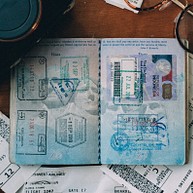
Passport / Visa
Greece can be visited visa-free for up to 90 days by citizens of most European countries, Australia, New Zealand, Japan, South Korea, Taiwan, Malaysia, Israel, UAE and most countries in America. If you are unsure whether or not you need to apply for a visa, we recommend contacting the embassy or consulate in your country. International (non-Schengen) travellers need a passport that is valid for at least 3 months after the end of their intended trip in order to enter the Schengen zone. Citizens of Schengen countries can travel without a passport, but must have a valid ID with them during their stay.
Read more

Taxi
Crete Taxi Services
+30 6970 021 970 of +30 6945 027 933
info@crete-taxi.gr
www.crete-taxi.gr/en
Crete Cab
+30 6955 171 473
info@crete.cab
www.crete.cab
Cretan Taxi
+30 6946 281 620
info@cretantaxi.com
www.cretantaxi.com
Read more

Chania International Airport (CHQ)
Chania International Airport "Daskalogiannis" is an international airport located near Souda Bay. It is is 12 km from the city of Chania and 68 km from the town of Rethymnon.
Read more
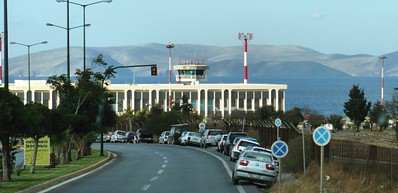
Heraklion International Airport (HER)
Heraklion International Airport "Nikos Kazantzakis" is the primary airport on the island of Crete and is the second busiest airport in Greece. The airport of Heraklion is but 5 km from the city of Heraklion and 65 km from Agios Nikolaos.
A new airport for Heraklion, located 39 km to the south-east of the city at Kastelli, is under construction. It is scheduled to open by 2025. The new airport will replace the current Heraklion International Airport as the hub for central Crete.
Read more
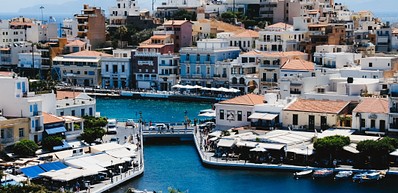
Agios Nikolaos Cruise Port
Cruise ships dock right in the centre of Agios Nikolaos. The small town with ancient history serves as a hub to the thirty or so small villages and settlements in the Lassithi region. The rural areas close to the port are experiencing rapid growth, especially in alternative forms of tourism.
The most alluring tourist attractions include the small island Agioi Pante, the archaeological museum and local fairs. The Lake Voulismeni — now a lagoon right next to the post — features a small park, traditional fishing boats, cosy cafes and even an amphitheatre.
Read more
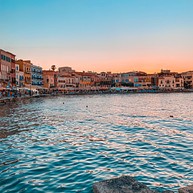
Chania Crete Cruise Port — Port of Souda
Cruise ships stop about 6 km (20 minutes by bus) from Chania, in the neighbouring town called Souda. Most ships tender. You can use a hop-on hop-off bus or a small tourist "train" to go between the port and the city centre.
The busses are right outside the terminal. Take the opportunity to explore the charming medieval town, some of the best beaches in Greece, ancient castles and the unique natural landscapes. Restaurants, free city WiFi, bars, shopping malls and traditional tavernas are at your disposal.
Read more
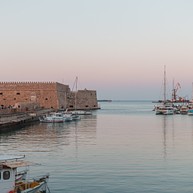
Heraklion Cruise Port
Cruise ships will dock at the port. The city provides convenient shuttle busses to the passenger terminal, which is only 15 minutes away from the city centre. The walk is quite nice, but you can always take a taxi, too
Regularly scheduled ferries serve the routes to the Greek islands Ios, Paros, Mykonos, Rhodes and Santorini. There are also daily ferries to Piraeus-Athens in mainland Greece.
Heraklion offers a plethora of museums, summer art festivals, numerous historical sights, great cuisine and fun nightlife.
Read more

Post
The main post offices are open Monday to Friday from 8 am to 8pm and Saturday from 8 am to 2 pm. Other post-offices will generally be open from 8 am to 2 pm only from Monday to Friday.
Here are the main post offices of the bigger cities:
Platia Daskalogianni 1, Heraklion, Kreta
+30 2810 289 994
Peridou 10, Chania, Crete
+30 2821 028 444
Moatsou 19, Rethymno, Crete
+30 2831 022 303
Read more
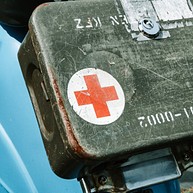
Pharmacy
Normal opening hours of the pharmacies are the same as shops during week days. On Sundays they are generally closed. Each pharmacy has a notice in the window showing which ones are open out of normal hours and the address where they're located.
Here are some pharmacies located in the main cities:
Kaniadakis Anthony pharmacy
Odos Kassanon 203, Heraklion, Crete
+30 2810 239 923
Pharmacy Mpitsaki-Verigakis
Πλατεία 1866 και, Kriari 45, Chania, Crete
+30 2821 092 447
Pharmacy Michail Papadakis
Adelianos Kampos 59, Rethymno, Crete
+30 2831 071 431
Read more

Telephone
Country code: +30
Area code: 2810
Read more

Electricity
Greece uses the Type F electrical plug with two round pins, same as in many countries in Continental Europe. The standard voltage is 230 volts, but some hotels have special plugs for 110 or 120-volt shavers.
Read more


